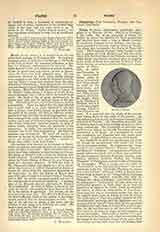

Ficino, MARSILIO, philosopher, philologist, physician; b. at Florence, October 19, 1433; d. at Correggio, October 1, 1499. Son of the physician of Cosmo de’ Medici, he served the Medicis for three generations and received from them a villa at Monte Vecchio. He studied at Florence and at Bologna; and was specially protected in his early work by Cosmo de’ Medici, who chose him to translate the works of Plato into Latin. The Council of Florence (1439) brought to the city a number of Greek scholars, and this fact, combined with the founding of the Platonic Academy, of which Ficino was elected president, gave an impetus to the study of Greek and especially to that of Plato. Ficino became an ardent admirer of Plato and a propagator of Platonism, or rather neo-Platonism, to an unwarranted degree, going so far as to maintain that Plato should be read in the churches, and claiming Socrates and Plato as forerunners of Christ. He taught Plato in the Academy of Florence, and it is said he kept a light burning before a bust of Plato in his room. It is supposed that the works of Savonarola drew Ficino closer to the spirit of the Church. He was ordained priest in 1477 and became a canon of the cathedral of Florence. His disposition was mild, but at times he had to use his knowledge of music to drive away melancholy. His knowledge of medicine was applied very largely to himself, becoming almost a superstition in its detail. As a philologist his worth was recognized, and Reuchlin sent him pupils from Germany. Angelo Poliziano was one of his pupils.
As a translator his work was painstaking and faithful, though his acquaintance with Greek and Latin was by no means perfect. He translated the “Argonautica”, the “Orphic Hymns”, Homer’s “Hymns”; and Hesiod’s “Theogony”; his translation of Plato appeared before the Greek text of Plato was published. He also translated Plotinus, Porphyry, Proclus, Iamblichus, Alcinous, Synesius, Psellus, the “Golden Thoughts” of Pythagoras, and the works of Dionysius the Areopagite. When a young man he wrote an “Introduction to the Philosophy of Plato”; his most important work was “Theologia Platonica de anima-rum immortalitate” (Florence, 1482); a shorter form of this work is found in his “Compendium theologise Platonicae”. He respects Aristotle and calls St. Thomas the “glory of theology”; yet for him Plato is The philosopher. Christianity, he says, must rest on philosophic grounds; in Plato alone do we find the arguments to support its claims, hence he considers the revival of Plato an intervention of Providence. Plato does not stop at immediate causes, but rises to the highest cause, God, in Whom he sees all things. The philosophy of Plato is a logical outcome of previous thought, beginning with the Egyptians and advancing step by step till Plato takes up the mysteries of religion and casts them in a form that made it possible for the neo-Platonist to set them forth clearly. The seed is to be found in Plato, its full expression in the neo-Platonists. Ficino follows this line of thought in speaking of the human soul, which he considered as the image of the God-head, a part of the great chain of existence coming forth from God and leading back to the same source, giving us at the same time a view of the attributes of God and of his relations to the world. His style is not always clear. Perhaps his distinctive merit rests on the fact that he introduced Platonic philosophy into Europe. Besides the works already mentioned, he left: “De religione Christiana et fidei pietate”, dedicated to Lorenzo de’ Medici; “In Epistolas Pauli commentaria”; Marsilii Ficini Epistolae (Venice, 1491; Florence, 1497). His collected works: Opera (Florence, 1491, Venice, 1516, Basel, 1561).
M. SCHUMACHER

